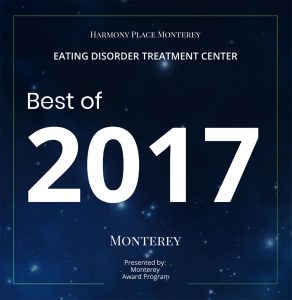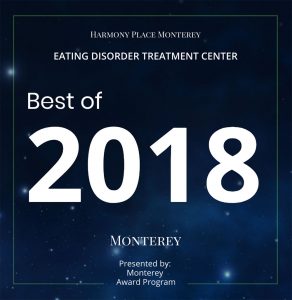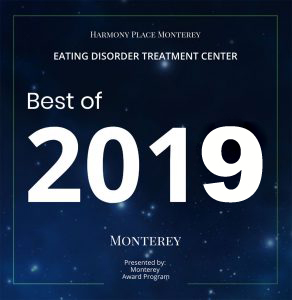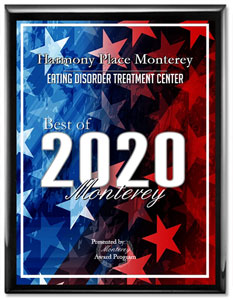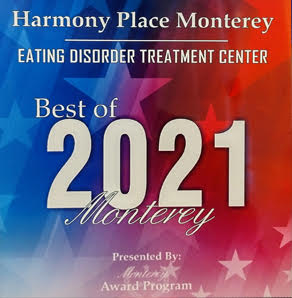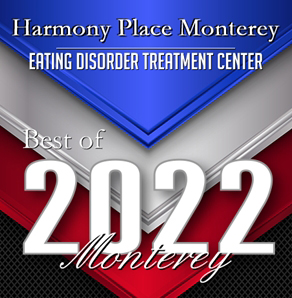Depression Afflicts 350 Million People Worldwide
Harmony Place Monterey specializes in treatment of recalcitrant (prior treatment failure) depression. With a treatment model that includes therapy as well as may include psychiatric medications to stabilize the depression and improve the potential outcomes of therapeutic processes, here are few updates as to what’s transpired as of late in the research and medical treatments available to alleviate depression:
- In 2019, the FDA approved Brexanolone (ZULRESSO™), which is a drug indicated for the treatment of postpartum depression. It targets the GABA pathway. With this treatment, depression is reported to have improved within two days.
- Esketamine (SPRAVATO™), made from a drug called ketamine, an anesthetic that has also been used for many years to treat depression, is available as a nasal spray and has been found to improve depression within hours.
- Psilocybin, a naturally occurring psychedelic pro-drug compound produced by more than 200 species of fungus has been granted “breakthrough designation” by the FDA with several depressed individuals Two out of three reported a reduction of depression of more than fifty-percent (50%) in one week, seventy-four percent (74%) after four weeks.
- Neuromodulation, the alteration of nerve activity through targeted delivery of a stimulus, such as electrical stimulation or chemical agents, to specific neurological sites in the body,
- via Vagal nerve stimulation and repetitive Transcranial Magnetic Stimulation (TMS), results in a delayed improvement for depression.
- Racemic Ketamine, which is a racemic mixture containing equal parts of R-ketamine and S-ketamine, is approved as an off-label treatment for depression. Infusion twice a week for two weeks resulted in seventy percent (70%) of clients with severe depression having responded positively.
- MDMA, a Methylenedioxymethamphetamine (MDMA), commonly known as ecstasy (E) or molly, is a psychoactive drug is described as an “empathogenic” drug because of its empathy-producing effects, has been successful in trials with a very specific therapy protocol and resulted in significant improvement for PTSD. MDMA potentiates the effect of psychotherapy.
- Genetic testing of Cytochrome P 450 can identify which medication works best and worse and is now a test that is fully covered by Medicare.
References
Al-Harbi, K. S. (2012). Treatment-resistant depression: Therapeutic trends, challenges, and future directions. Patient Preference and Adherence, 6, 369-388.
Alarcon, R. D. (2009). Pharmacogenomic Perspectives on the Management of Mood Disorders. The Psychiatrist, 33, 361–363.
Carroll, J. (2007). Biogenetic Tests Emerge from their Chrysalis. Biotechnology Healthcare, 4(5):37-44.
Gillman, P. K. (2009). Serotonin Syndrome: History and Risks. Fundamental and Clinical Pharmacology, 12(5), 482–491.
Gunduz-Bruce, H., Silber, C., Kaul, I., Rothschild, A.J., Riesenberg, R., Sankoh, A.J., Li, H., et al. (2019). Trial of SAGE-217 in patients with major depressive disorder. N Engl J Med. 381: 903-911.
Johns Hopkins Medicine (2019). Transcranial Magnetic Stimulation (TMS) service. Retrieved from https://www.hopkinsmedicine.org/psychiatry/specialty_areas/brain_stimulation/tms/index.html
Lee, J. C., Blumberger, D. M., Fitzgerald, P. B., Daskalakis, Z. J., & Levinson, A. J. (2012). The role of transcranial magnetic stimulation in treatment-resistant depression: A review. Current Pharmaceutical Design, 18(36), 5846-5852.
Mrazek, D. A. (2006). Psychiatric pharmacogenomics. Focus, 4, 339–343.
Penas-Lledo, E.M. et. Al (2013). CYP2D6 Ultrarapid Metabolism and Early Dropout from Fluoxetine or Amitriptyline Monotherapy Treatment in Major Depressive Patients. Molecular Psychiatry, 18, 8-9.
Prudic, J., Haskett, R. F., Mulsant, B., Malone, K. M., Pettinati, H. M., Stephens, S., … Sackeim, H. A. (1996). Resistance to Antidepressant Medications and Short-term Clinical Response to ECT. American Journal of Psychiatry, 153(8), 985-992.
Stern, A. P. (2018, February 23). Transcranial Magnetic Stimulation (TMS): Hope for Stubborn Depression [Blog post]. Retrieved from https://www.health.harvard.edu/blog/transcranial-magnetic-stimulation-for-depression-2018022313335
Van Bronswijk, S., Moopen, N., Beijers, L., Ruhe, H. G., & Peeters, F. (2019). Effectiveness of Psychotherapy for Treatment-resistant Depression: A meta-analysis and meta-regression. Psychological Medicine, 49(3), 366-379.
